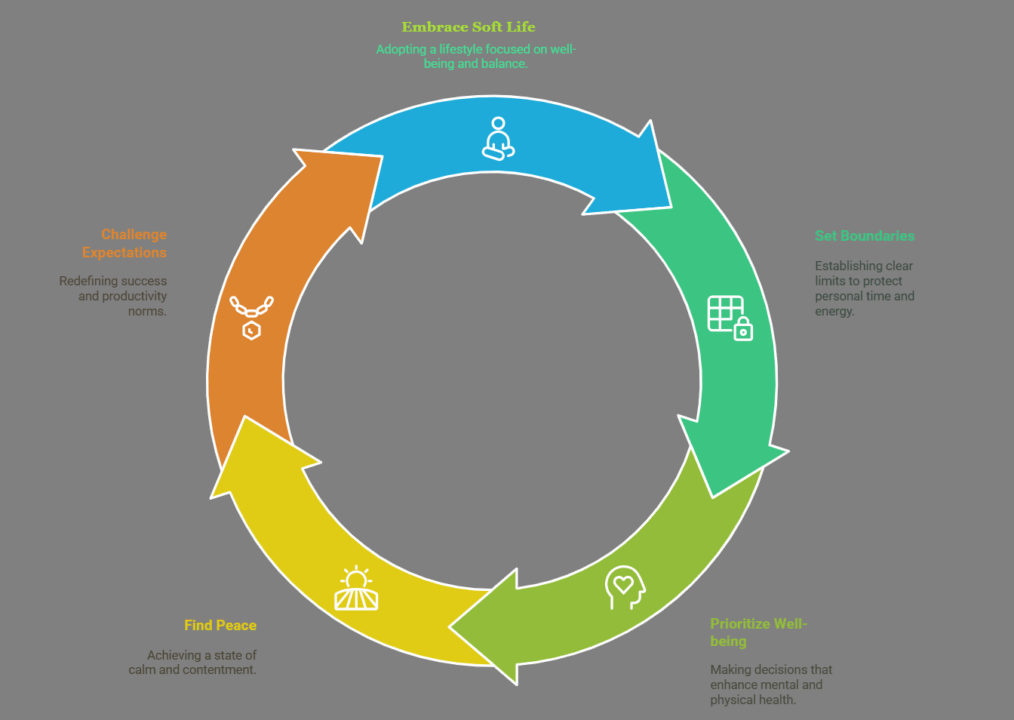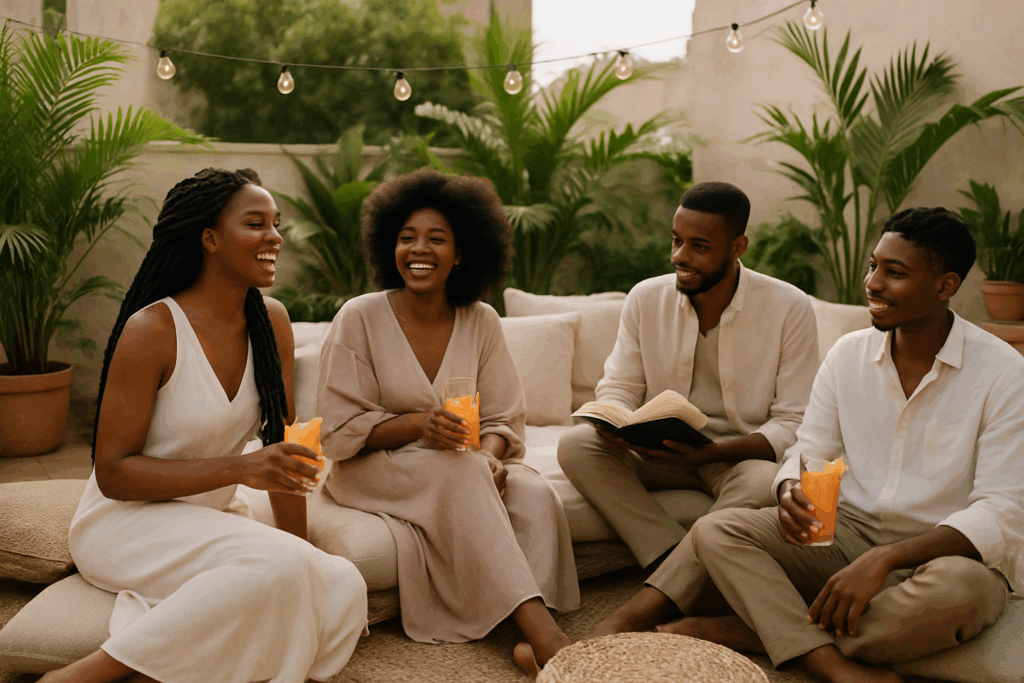From a young age, Black people, especially women, are told that they have to work twice as hard to achieve the same things as their white counterparts. This mantra was born out of a need to survive and got passed down through generations, influencing everything from our career paths to our personal boundaries. Through the years, we’ve always been praised for our incredible ability to bounce back, to “make a way out of no way,” and for staying strong no matter what came our way.
In recent years, there has been a powerful cultural shift among Black professionals and creatives globally: the embrace of the soft life.
If you’ve spent any time on social media, you’ve likely noticed the rise of the soft life. It’s hard to miss the hashtags. Black girls and women on TikTok, Instagram, and other social media platforms are using the soft life hashtag to describe the lifestyle shift they are making.
What is this soft life that is replacing the traditional hustle mentality?
According to the Urban Dictionary, soft life is the “Opposite of hard life. Where do you make decisions that leave you feeling stress-free and vibrating higher? Less about wealth (though it helps) and more about making good choices.”
It is believed to have originated within the Nigerian influencer community before spreading globally, largely through social media platforms and being adopted by Black women in the West.
Contrary to common misconceptions, the #softlife movement, which has garnered millions of views on TikTok, isn’t about laziness or a refusal to work. It is all about putting your well-being first, setting boundaries, and finding peace instead of getting caught up in relentless productivity and societal expectations. We’re talking about taking back our joy and finding balance in a world that often expects Black people to work themselves to the bone with nothing to show for it but exhaustion. Many Black people, especially millennials and Gen Zs, are choosing the soft life and flipping the script on workplace success and well-being.
Soft life isn’t about doing less, it’s about doing it gently, says Ayomide Juliet, a brand influencer. “Slow mornings, cute moments, and showing up as the version of me that feels at peace. This is your sign to start living soft—on purpose.”
What Soft Life Means to Blacks
As explored by Ms. Magazine and Forbes, for Black people, embracing a “soft life” means:
Rejecting hustle culture: Hustle culture is out; soft life is in, as Black men and women were quietly quitting their hard lifestyles. Black women, especially, are making a conscious effort to unlearn the mantra of working twice as hard. They are refusing to put up with society, always expecting them to endure pain, trauma, and struggle without showing vulnerability or needing rest. Rather than live a life of stress trying to be a career mogul, a style icon, and someone who’s emotionally available to friends and family 24/7, they are taking a softer approach to life.

Prioritizing mental and emotional health: People are recognizing that living their best life begins with making intentional choices that lead to enjoyment and balance. Prioritizing mental and physical well-being is key to living a soft life. That means you have to make time for regular self-care and engage in activities that bring joy and help you relax. This approach is like an antidote to the constant pressure to perform and achieve.
For Black individuals, the goal is now to build a life and career where rest is a necessity, not a luxury, and where personal well-being dictates their speed, not external pressures.
Living intentionally while creating boundaries: A big part of living the soft life means you have to consciously draw the line between your job and your personal time. It is about being intentional with your time and energy. According to a December 2023 study published in Frontiers of Psychology, people experience an increase in emotional exhaustion and reduced happiness when work-life boundaries are blurred.
If you want to tow the soft life path, you have to constantly ask yourself: “Can I take on this extra responsibility?” You have to know your limits and stick to what you can handle, instead of taking on too much and breaking down from stress.
“The soft life starts with emotional regulation and a relaxed nervous system. What has worked for me is meditation, energy work & yoga. Journaling. Being in nature. Finding the right diet & drinking lots of water. Rest. Protecting my energy. Strong boundaries. Staying in my lane. And surrounding myself with healthy relationships & love,” said Nika Solé, a wellness blogger on X and Instagram, in April 2024.
Choosing peace and a gentle life: Blacks have finally realized that their worth isn’t measured by how much they suffer or how much they overwork themselves. They are deliberately pursuing comfort and relaxation, making space for a life that is gentle, nourishing, and deeply fulfilling. What does this look like? It’s finding joy in the little things, like a leisurely walk through a park, breathing deeply, and noticing the simple beauty around you.
Financial independence: Many Black professionals are no longer content with being employees and are exploring entrepreneurship to create the freedom they desire. The goal is to build something that generates income on their terms, providing them the opportunity to enjoy a soft life.

The Rise of the Soft Life and New Black Work Culture
Welcome to the era of the soft life and the glorious new Black work culture that champions flexibility, entrepreneurship, and mental well-being.
In today’s digital age, Black entrepreneurs and freelancers are leveraging social media platforms to create multiple income streams, allowing them to work on their terms and prioritize well-being.
Thanks to platforms like TikTok, Instagram, and YouTube, which have helped popularize and monetize the soft life trend. With digital platforms making it easier to launch businesses, more Black-owned brands are emerging in industries like tech, fashion, wellness, and finance.
Black creators post clips of spa days, beach getaways, and work-from-anywhere lives, challenging the deeply ingrained notion that suffering is a prerequisite for success.
A quick search of “#softlife” will summon countless posts of (mostly) women, sharing how they won’t be taking part in the hustle culture. One of my favorite soft-life snippets was created by @simplysayo, who said: “Soft life, more than just a lifestyle, it’s a way of life.”
“I will do the bare minimum. I won’t be working hard; I’ll be hardly working.
“If it doesn’t serve me, it don’t deserve me. I will book flights and I won’t think twice. I will treat myself, who cares the price. I will chop life in all of its sweetness. Soft life, it’s my human right,” she added.
From an outsider’s view, those joining the soft life trend may come across as the “lazy” generation our elders keep complaining about.
However, many influencers have highlighted that the soft life is more about what’s inside than what you show off. It’s less about being rich, lazy, or showing off online and more about your inner peace.
“A soft life doesn’t mean you’re not working. It means you’ve mastered the art of leverage so the work gets done while you ENJOY. That’s the real flex,” says quianawatson_.
The Future of Black Work Culture
The soft life movement, particularly strong within the Black community, is not a fleeting trend. As more Black professionals adopt this new work culture, we are likely to see long-term changes in how businesses operate and how employees advocate for themselves.
The future will see more Black professionals increasingly forging paths in careers and entrepreneurship that grant them more autonomy, reduced stress, and the freedom to unapologetically place personal peace before the hustle. The secret? Often, entrepreneurship or flexible work.
The soft life movement isn’t stopping anytime soon when it comes to changing Black work culture. We’re looking at a future where Black professionals aren’t just hanging on and grinding, they’re actively crafting environments where they can truly flourish.





